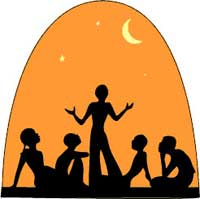The first question that Brian McLaren engages in his book is, "What is the overarching story of the Bible?"
This is an excellent question to bring up, because humans are creatures of stories. When we are little, we want to hear the same story again and again. We have favorite stories that describe what's going on in our lives. We love to listen and tell the stories that have impacted us.
After reflecting on this fact and this section of the book for a few days, I think that the overarching story of the Bible is...wait for it...
"Who am I?"
The whole of scripture is an exploration of what it means to be God's people. The Old Testament wrestles with creation as God's creation and how a certain people came to know and experience God. It continues as they wrestle with what God wants them to do because they have been chosen as God's people.
The different books and stories explore how their trials and tribulations, as well as their causes for celebration engage with God's promises.
The Old Testament (for Christians) culminates with an experience of God in Jesus Christ, as witnessed to by the Gospels. The letters of Paul and the Acts of the Apostles are also written wrestling as those who followed Jesus Christ try to understand what exactly their faith means based on the crucifixion and resurrection.
The whole story culminates in the Revelation of John as John writes down about the end of human history as God's chosen people.
"Who are we?"
When we think about the scriptures as a series of stories that wrestle with this question, it helps us to make them more applicable to our daily lives. Instead of being stories that are about a place long long ago in a galaxy far away, they are stories that mirror stages of our very own lives.
We want to know what we're supposed to be when we grow up.
We want to know what it means to be a child, a sister, a father, a mother, a brother, a grandparent, a friend.
We want to know what it means to be a Child of God - claimed by God's own act.
By interpreting the scriptures as a story that wrestles with a peoples' identity, we allow the scripture to be more than just a record or a fact. Opening up the scripture to answer an overarching question - this struggle with identity - we open ourselves up to the larger meaningfulness of the story.
I can picture the Hebrew people and their ancestors sitting around a fire or a meal to share these stories about who they are, and where they came from. Just like our stories at Thanksgiving or Christmas.
These stories are an important part of who we are as Children of God. More importantly though, through the telling of stories that central message can be passed from generation to generation.
The Levitical laws, for example, aren't just good suggestions or commands to not eat bacon. No, they are stories that emphasize how the children of God are set apart from other peoples.
The story of Abraham and Sarah isn't a story that's just about the father of a nation. No it's a story about how experiences with God bring life, sometimes laughter, and change.
All of these are stories that say being chosen as God's people means something tangible in our lives as part of the mystery and beauty of creation.
And so, armed with these beautiful stories we engage in conversations with one another in our communities - just like we did in high school English Lit classes, as we try to understand how these stories are our stories.
We want to know what we're supposed to be when we grow up.
We want to know what it means to be a child, a sister, a father, a mother, a brother, a grandparent, a friend.
We want to know what it means to be a Child of God - claimed by God's own act.
By interpreting the scriptures as a story that wrestles with a peoples' identity, we allow the scripture to be more than just a record or a fact. Opening up the scripture to answer an overarching question - this struggle with identity - we open ourselves up to the larger meaningfulness of the story.
I can picture the Hebrew people and their ancestors sitting around a fire or a meal to share these stories about who they are, and where they came from. Just like our stories at Thanksgiving or Christmas.
These stories are an important part of who we are as Children of God. More importantly though, through the telling of stories that central message can be passed from generation to generation.
The Levitical laws, for example, aren't just good suggestions or commands to not eat bacon. No, they are stories that emphasize how the children of God are set apart from other peoples.
The story of Abraham and Sarah isn't a story that's just about the father of a nation. No it's a story about how experiences with God bring life, sometimes laughter, and change.
All of these are stories that say being chosen as God's people means something tangible in our lives as part of the mystery and beauty of creation.
And so, armed with these beautiful stories we engage in conversations with one another in our communities - just like we did in high school English Lit classes, as we try to understand how these stories are our stories.

No comments:
Post a Comment